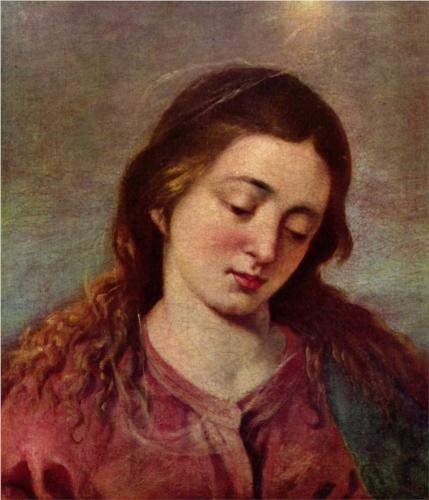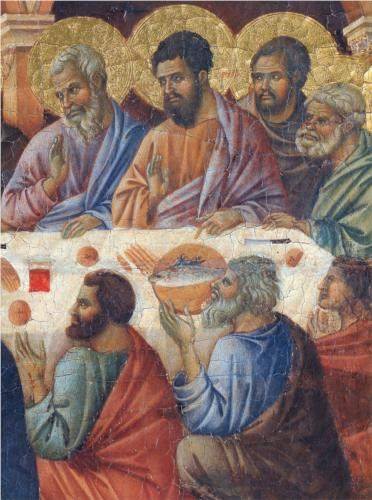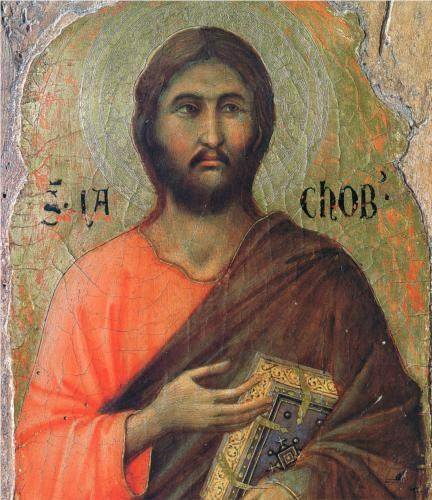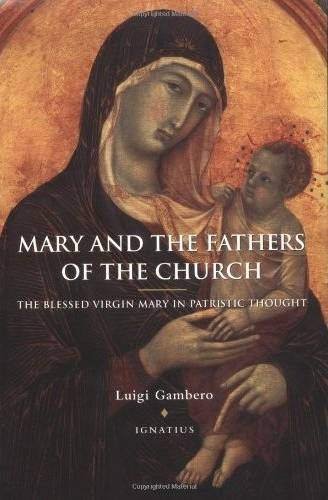
Adoration of the Shepherds (1646), by Rembrandt. (WikiPaintings.org)
It being Christmas, the celebration of Nativity of the Lord, it seems appropriate that I make this post that has been on my mind for a week or two, regarding the Perpetual Virginity of Mary.
The Perpetual Virginity of Mary is one of those Marian dogmata that over much of my conversion, I affirmed more out of loyalty to the Church than out of credulity. I accepted that the Catholic Church was the true Church of Christ and the bearer of Apostolic Tradition, and therefore I would abide by her teachings. But being a lifelong Protestant, I didn’t believe that really, did I? It was one of the two doctrines I struggled with most (the other being Mary as Παναγία [Panhagia] or All-Holy), because there simply was no biblical support for it at all. In fact, Scripture says the opposite: Jesus had brothers and sisters (Mark 6:3, Matthew 13:55–56). This doctrine seemed to me to be a demonization of human sexuality, equating sex with sin and undermining the Church’s teaching on the family: the Holy Family was not a functioning, conjugal, procreative family at all, but one consisting of Mary Ever-Virgin, All-Holy; Joseph, her “most chaste spouse”; and the Christ Child, who was God Himself. The perpetual virginity smacked of the kind of argument one would expect from an admiring child: “My Mother never did that!”
It was reading Fr. Luigi Gambero’s Mary and the Fathers of the Church that opened my eyes: Belief in the perpetual virginity has been a part of the Christian faith since the very beginning. It does not undermine teachings on the family, but affirms the Full Humanity and Full Divinity of Christ. It does not equate sex with sin, but holds forth Mary’s womb as the sacred sanctuary, the Holy of Holies, the Ark of the New Covenant, that it must have been to contain God Himself. The Protoevangelium of James, an early apocryphal gospel, can be dated to around A.D. 120, and though certainly not historical, it testifies clearly to a firm belief in Mary’s perpetual virginity at that early date; in fact, supporting it seems the text’s principal aim. Though pseudepigraphical, claiming as its author James the Just, the “brother of the Lord,” the text was written within living memory of Mary. Origen, writing early in the third century, rejected the text, but nonetheless concurred with its author in affirming Mary’s perpetual virginity (Origen, Comm. Matt. 10.17). And indeed Mary’s perpetual virginity was affirmed by Fathers of the Church from then on; questioned and at times challenged, but always defended and maintained.*
* I don’t have the Gambero book with me at the moment, or I would give you some quotations; it’s still in a box somewhere lost among a mountain of other boxes. But it is chocked full of patristic quotations on every aspect of Marian doctrine, if anyone should be interested.
Over the year or two I’ve been becoming Catholic, though, I have realized that there is scriptural support for Mary’s perpetual virginity. I found another strong indication just last week, and wanted to rush here immediately to share it.

Virgin Mary (c. 1600), by El Greco. (WikiPaintings.org)
Behold, Your Mother
First of all, and most prominently: Jesus on the Cross, in the Gospel of John, gives his mother into the care of John (John 19:26–27):
When Jesus saw his mother and the disciple whom he loved standing nearby, he said to his mother, “Woman, behold, your son!” Then he said to the disciple, “Behold, your mother!” And from that hour the disciple took her to his own home.
It would make little sense for Jesus to place his mother in John’s care if she had other children living — and, according to the Protestant argument, she certainly did: at the very least James, “brother of the Lord,” and Jude, who both wrote New Testament epistles. Therefore it seems that James and Jude and the other “brethren” of the Lord were not “brothers” in the full and literal sense, but rather in the sense of “kinsmen.” This is not a new argument; the Fathers discovered it ages ago, as Gambero illustrates.

Maria (c. 1648), by Alonzo Cano. (WikiPaintings.org)
Apostles and Brothers of the Lord
More and more lately, as I dig deeper into the New Testament, I’ve been becoming aware of another argument that undoubtedly supports the argument the “brethren” of the Lord were not full and literal “brothers.” I explored it to some degree in my post on the Apostles named James. At the time, I considered the conclusion somewhat fanciful and poorly supported — but you know, one instance of this in Scripture might have been a case of poor wording; but two or three, and the idea gains some weight.
St. Paul, in writing to the Corinthians, examines the “rights” of the Apostles (1 Corinthians 9:5):
Do we not have the right to take along a believing wife, as do the other apostles and the brothers of the Lord and Cephas?

Appearance of Christ to the Apostles (fragment) (1311), by Duccio. (WikiPaintings.org)
In increasing order of importance, Paul lists: (1) the other Apostles, (2) the brothers of the Lord, and (3) Cephas, or Peter, the chief Apostle. Together, this statement seems to refer to the Twelve, and includes “the brothers of the Lord” among them — brothers plural, implying at least two “brothers of the Lord” were among the number of the Apostles.
Protestants, of course, argue that Paul is using the word “apostle” in a broader sense than in reference to the Twelve — after all, Paul himself was an “apostle” and not one of the Twelve. An “apostle” (ἀπόστολος) is literally anyone who has been sent. But in an analysis of the Greek New Testament, it seems that it is rarely used in this broad sense*, but that the term is a specific and technical term referring to an office of the Church, and applied almost exclusively to the Twelve and to Paul.
* See analysis below.
Which brings me to my discovery last week: In Galatians, perhaps the earliest of Paul’s letters, we have one of the most unambiguous examples of the word apostle. Following Paul’s conversion, he did not immediately go to Jerusalem to consult with “those who were Apostles before me” (Galatians 1:17). But then (Galatians 1:18–19):
Then after three years I went up to Jerusalem to visit Cephas and remained with him fifteen days. But I saw none of the other apostles except James the Lord’s brother.
Immediately I was struck. I was impressed by the example above in 1 Corinthians, though it was rather unspecific; but here we have it clear and unambiguous: James, the “brother” of the Lord, was an Apostle — and not just an “apostle,” meaning a messenger or someone who was sent, but one who was an Apostle before Paul — one of the Twelve.

The Apostle James Alphaeus (1311), by Duccio. (WikiPaintings.org)
But how is this possible? We know the names of the Twelve Apostles, and none of them are identified as brothers of the Lord (Matthew 10:1–3, Mark 3:13–18, Luke 6:12–16, Acts 1:12–14). But there are two Apostles named James — James, called the Greater, the son of Zebedee; and James, called the Less, the son of Alphaeus. James the Greater was certainly dead by the time Paul met with the other Apostles in Jerusalem (Acts 12:1–3). So if the James whom Paul met was one of the Twelve, then it follows that James, the “brother” of the Lord, is in fact James the Less, the son of Alphaeus.
But how, then, can he be a “brother” of the Lord? Well, as I demonstrate in the other post focusing more intently on this problem, neither the Hebrew language nor the Aramaic language which Jesus spoke had a word for “cousin” — which it seems this James may have been (see the post). The word ἀδελφός in Greek, too, could carry the connotation of “kinsman” or any relative. Though the Scripture says “not even his brothers believed in Him” (John 7:5), it does not say that none of His brothers (i.e. kinsmen) believed in Him. James the Less may have been one of the less ardent and conspicuous Apostles during Jesus’s earthly life and ministry, but as a cousin Jesus would have called him “brother,” in an even closer sense than he called all the Apostles “brothers” (e.g. John 20:17) — an epithet he carried with him for the rest of his life. Following his witness of Jesus’s Resurrection, it seems that James the Less — James the Just — stepped up to his calling and served the Lord with his life.
A merry and blessed Christmas to all of you, dear brothers and sisters.
* Appendix: An Analysis of the Word “Apostle” (ἀπόστολος) in the Greek New Testament
In conclusion, though the word ἀπόστολος can have a general usage as “messenger” in Greek, in the New Testament it is rarely used in that sense (once or at the most twice out of 81 uses). Rather “apostle” is a specific and technical term referring to an elite office and ministry of the Church, holding more authority than elders (πρεσβύτεροι or presbyteroi) — who in time became priests as we know them. When any “apostles” are identified, it seems that the term is applied exclusively to the Twelve, to Paul, and twice to Barnabas.


The only argument that could stick for me is from the Gospel of John–for indeed, why would the beloved apostle need to take Mary into his home if she had other sons who would be responsible for her? This is tempered by the reality that the Gospels are not historical documents–for being written within a generation after Jesus’ life, and being that they are written about the Messiah, you’d think that they would be more accurate with regards to each other–John is by far the worst offender, being the latest Gospel written and the most different from the others. While John is a theological treasure trove full of deep ideas and teachings, historicity appears to have been of small importance.
Apostles and brothers of the Lord–it is unfortunate that I am writing this comment away from home where my resources are, but I recently did a search and review of every instance of the Greek word “apostle” in the New Testament. From what I remember, the meaning of the word depends heavily on who is writing. The Gospels unanimously speak of the Apostles as the Twelve. Acts, if I remember, seems to all but maybe once use the word in the same way, which is to be expected since Luke is the author.
But when it comes to Paul, I have to disagree that he primarily uses the word to mean the Twelve. In your own analysis above, you list a number of instances in which Paul is “probably” referring to the Twelve, but it is just as likely, if not more likely, that he is speaking more broadly. There is no indication either way, except when he is explicitly referring to the Twelve. It is unfair to the text to simply assume, “Well, he MUST be talking about the Twelve, because who else would he be talking about?” when he clearly uses the title for other people.
Therefore, when he talks about James the Apostle and the brother of Jesus, it is quite possible that he means exactly what he says.
In our day and age, we put a lot of stock in being able to remember things, to record them, and to pass them on. That was not the case in the ancient world, else we would have many more records and stories. It is notable that, as mentioned above, the historical details of Christ’s life and immediately after are often in conflict with each other, and there are many gaping holes. Even when people did their best to write everything down and preserve it, we still have a vastly incomplete picture. No one could remember what Jesus did for the first 12 years of his life, not even any stories to pass on. So it is very shaky ground to assume that just because we think something was important, it would automatically have survived.
All that being said, it is definitely possible that Mary remained a virgin all her life. We don’t know. I’m beginning to understand that Lutheranism, and certainly myself, has a deep understanding of “adiaphora”, or “indifferent things”, things that don’t matter to the faith. Whether Mary was a virgin all her life doesn’t change what Jesus did, what God did, and our response to that act of love.
Hmm, I guess my reply to you wasn’t actually to you. See below.
Well, if we believe that the Apostle John actually wrote the Gospel of John, then I think he of all people would have known, as an historical fact, that Jesus charged him to take care of his mother.
Well, I broke down above every use of the word “ἀπόστολος” in the NT that I could find. To me it’s clear that “apostle” was used mostly as a special technical term, referring not just to any common messenger but to someone who was sent with a specific and higher charge. According to the BDAG, it was used only in rare and isolated cases in other Greek literature. The fact that Paul notes some doubt about whether some would consider him an “apostle” or not (1 Cor 9:2) supports that it has a specialized meaning. Certainly the cases in when he uses the definite article (“the apostles”) can be presumed to refer to the Twelve.
Galatians 1:19 is one of those cases. It’s even clearer in the Greek than in translation: ἔτερον δὲ τῶν ἀποσόλον οὐκ εἷδον, εἰ μὴ Ἰάκωβον τὸν ἀδελφὸν τοῦ κυρίου. “Another of the apostles I did not see, except (lit. if not) James the brother of the Lord.” So the “apostles” are a group whose membership is defined; and James is someone who was an “apostle” before Paul. And Acts does not refer to anybody else as an “apostle” until after Paul’s calling.
Also, the Gospels refer on a number of occasions to “James” and “Mary, the mother of James,” as if “James” is someone the readers are supposed to know without any further explanation. The fact that James the bishop of Jerusalem appears without any introduction in Acts 12:17 and chapters 15 and 21 indicates that he is someone who has already been introduced — and he has, in Acts 1:12. Luke is careful to distinguish “James the brother of John” from this other James in Acts 1:12; and yet he never gives any other detail about this other “James.” If James in Jerusalem, the “brother” of the Lord, is some other, new character, you’d think Luke would have told us.
Mary’s perpetual virginity doesn’t really have anything integral to do with salvation or with Jesus’s divinity or with being who he said he was. Joseph Ratzinger noted this, to my surprise, in Introduction to Christianity: the Virgin Birth and Jesus being the Son of God are quite different claims, and not necessarily related to each other. We call Jesus the Son of God because he called God “Father,” not because the evangelists claim his mother was a virgin.
… But, a lot of Catholic Marian dogma is built upon it. And essential or not, I’ve come to see it as quite beautiful and worthy of belief and illustrative of the Father’s love for us and his plan of salvation. And the fact that, without even really looking for it, I keep stumbling upon these evidences that support it, leads me to trust it, and the reasoning of the Church Fathers, more and more. (Seriously, reading in Galatians, I stumbled on that verse, and said, “What? James the brother of the Lord was an Apostle?”)
Pingback: The Veneration of Mary: An Introduction for Protestants « The Lonely Pilgrim
I have often wondered about the biblical support for what I’ve always seen as an absurd claim to Mary’s Perpetual Virginity… Thank you very much for providing it. You’ve given me food for thought, as always. I think we too often forget that the Scriptures are in translation, and not always word-for-word, and therefore may be interpreted in different ways. On a personal level, Marian theology is really one of the only things giving me issue coming to the Catholic Church as a Protestant. Probably because it is just so foreign to me, as I’m sure you understand being an evangelical convert. What books would you recommend for a “beginner” looking for an overview of Marian theology?
Thanks. 🙂 I used to think it was absurd, too, but the more I study Scripture, the more I keep stumbling on spots that support the idea that James the Less is not the natural brother of Jesus.
I ordered a couple of books just this morning for my mom, who was asking questions about the Church’s Marian doctrines. I haven’t read them yet, but I have read other things by the authors, and I know they are going to be good — so I feel comfortable recommending them to you. One is Hail, Holy Queen by Scott Hahn, a Presbyterian pastor who converted to the Church and has become one of the leading Catholic apologists and theologians. The other is The World’s First Love: Mary, Mother of God by (Blessed) Bishop Fulton J. Sheen, who was a very popular and charismatic bishop who was on TV in the 50s and wrote a lot of books, and he’s a beautiful and moving and lovely writer. Also — this is not what I would recommend for a beginner at all, because it’s hard-core, but the book that did more than anything to help me is Mary and the Fathers of the Church by Luigi Gambero, which is a collection of quotations from the Church Fathers showing how all the Church’s beliefs about Mary date back to the beginnings of Christianity.
Thanks! Sorry, for some reason I didn’t see you replied to this until today when I came back to this post. I appreciate the recommendations! I’ll probably have to order them online since my school’s library is a bit biased towards the Baptists 🙂
I have been praying for you as you work on your thesis!
Thank you so much, dear friend. This is the week I’m really going to bear down hard. There is so much loveliness in the blogosphere… but I have to push that away for now. God bless you.